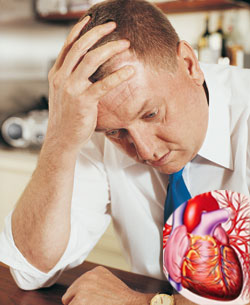Arteries are the vessels that carry blood with oxygen from the heart and lungs to all parts of the body, including the brain. Our cells require a steady supply of this oxygen in order to do their work. A lack of blood flow for more than four minutes can kill the cells of the body and brain. With aging, however, the walls of the arteries become narrowed with cholesterol deposits, just as sediment can build up inside plumbing pipes. When the buildup is large enough, or if a plug or blood clot blocks the narrowed artery, the artery is no longer able to supply blood to the cells.
A heart attack occurs when the arteries that supply blood to the muscle of the heart itself are blocked, and an area of cells in the heart muscle dies because of the lack of oxygen. Although a major heart attack may be immediately fatal, many people survive lesser heart attacks, and their hearts continue to function despite the damaged area of muscle. But when someone has had a heart attack, the risk of developing depression can be as high as 15 to 20 per cent. The shock of such a close brush with death can be terrifying. You are forced to take stock of the stresses in your life, and decide what is important to you. It’s upsetting to realize that, if you don’t make substantial changes in your lifestyle, you may die very soon. Joining a rehabilitation and exercise programme on your doctor’s advice and talking to someone about your fears can be helpful.
 Sometimes, after a heart attack or even before, your doctor may recommend bypass surgery. In this operation, unblocked veins from the leg are transplanted to the heart to replace damaged arteries. This procedure brings a better supply of blood and oxygen to the heart muscle, which helps the heart function better. Despite this improvement, almost 40 per cent of bypass patients develop clinical depression after the procedure. In the first year after surgery, this depressed group has three to four times more risk of dying than the people who do not develop depression after the surgery. We don’t know why there is such a high rate of depression, but treatment with adequate doses of antidepressants can help.
Sometimes, after a heart attack or even before, your doctor may recommend bypass surgery. In this operation, unblocked veins from the leg are transplanted to the heart to replace damaged arteries. This procedure brings a better supply of blood and oxygen to the heart muscle, which helps the heart function better. Despite this improvement, almost 40 per cent of bypass patients develop clinical depression after the procedure. In the first year after surgery, this depressed group has three to four times more risk of dying than the people who do not develop depression after the surgery. We don’t know why there is such a high rate of depression, but treatment with adequate doses of antidepressants can help.